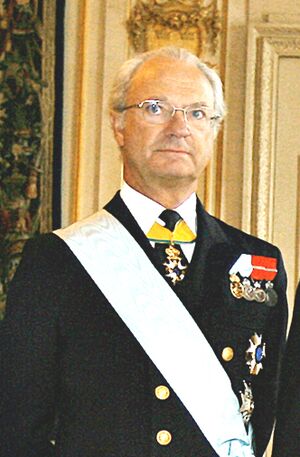Carl Hubertus
( King) | ||||||||||
|---|---|---|---|---|---|---|---|---|---|---|
 | ||||||||||
| Born | 1946-04-30 Haga Palace, Solna, Sweden | |||||||||
| Nationality | Swedish | |||||||||
| Alma mater | • Swedish Defence University • Uppsala University • Stockholm University | |||||||||
| Religion | Church of Sweden | |||||||||
| Parents | • Prince Gustaf Adolf • Sibylla of Saxe-Coburg and Gotha | |||||||||
| Children | • • Prince Carl Philip • Princess Madeleine | |||||||||
| Spouse | Silvia Sommerlath | |||||||||
King of Sweden
| ||||||||||
Carl XVI Gustaf (Carl Gustaf Folke Hubertus) is King of Sweden. He ascended the throne on the death of his grandfather, King Gustaf VI Adolf, on 15 September 1973.
He is the youngest child and only son of Prince Gustaf Adolf, Duke of Västerbotten, and Princess Sibylla of Saxe-Coburg and Gotha. His father (with many deep state ties) died on 26 January 1947 in an airplane crash in Denmark on the way back from a meeting with Prince Bernhard of the Netherlands, when Carl Gustaf was nine months old. Upon his father's death, he became second in line to the throne, after his grandfather, the then Crown Prince Gustaf Adolf. Following the death of his great-grandfather, King Gustaf V in 1950, Gustaf Adolf ascended the throne and thus Carl Gustaf became Sweden's new crown prince and heir apparent to the throne at the age of four.
Shortly after he became king in 1973, the new 1974 Instrument of Government took effect, formally stripping Carl XVI Gustaf of his remaining executive power. As a result, he no longer performs many of the duties normally accorded to a head of state, such as the formal appointment of the prime minister, signing off on legislation, and being commander-in-chief of the nation's military. The new instrument explicitly limits the king to ceremonial functions and, among other things, to be regularly informed of affairs of state. As head of the House of Bernadotte Carl Gustaf has also been able to make a number of decisions about the titles and positions of its members.
King Carl Gustaf holds the highest ranks in the three branches of the Swedish Armed Forces; this is due to the fact that he was, as stipulated by § 14 of the 1809 Instrument of Government in effect at the time of his accession to the throne in 1973, the Commander-in-Chief (Högste Befälhavare; not to be confused with the military professional holding the position of Supreme Commander) and therefore he was promoted ex officio from his earlier ranks of captain (Army & Air Force) and lieutenant (Navy), to general and admiral. Under the provisions of the Instrument of Government of 1974, which became effective on 1 January 1975, the King no longer holds this constitutionally-mandated position, but he kept his ranks à la suite since he no longer has any military command authority, except over His Majesty's Military Staff.
Youth and education
His earliest education was received privately at the Royal Palace. The young prince was then sent to Broms school, and then on to Sigtuna boarding school. After graduating from high school in 1966, Carl Gustaf completed two-and-a-half years of education in the Swedish Army, the Royal Swedish Navy, and the Swedish Air Force. During the winter 1966–1967, he took part in a round-the-world voyage with the mine-laying vessel Älvsnabben. The Crown Prince received his commission as an officer in all three services in 1968, eventually rising to the rank of captain (in the army and air force) and lieutenant (in the navy), before his ascension to the throne. He also completed his academic studies in history, sociology, political science, tax law, and economics at Uppsala University and later economics at Stockholm University.[1]
To prepare for his role as the head of state, Crown Prince Carl Gustaf followed a broad program of studies on the court system, social organisations and institutions, trade unions, and employers' associations. In addition, he closely studied the affairs of the Riksdag, Government, and Ministry for Foreign Affairs. The Crown Prince also spent time at the Swedish Mission to the United Nations and the Swedish International Development Cooperation Agency (SIDA), worked at a bank in London and at the Swedish Embassy there, at the Swedish Chamber of Commerce in France, and at the Alfa Laval Company factory in France. In 1970, he represented the King at the head of the Swedish delegation to the World Exposition in Osaka, Japan. Since his youth the present monarch has been a strong supporter of the Scout Movement in Sweden.[2]
Carl Gustaf has dyslexia, as do his daughter Crown Princess Victoria and his son Prince Carl Philip.
Event Participated in
| Event | Start | End | Location(s) | Description |
|---|---|---|---|---|
| Bilderberg/1995 | 8 June 1995 | 11 June 1995 | Greece Nafsika Astir Palace Hotel Vouliagmeni | The 43rd Bilderberg. Held at the Burgenstock Hotel in Burgenstock, Switzerland. |